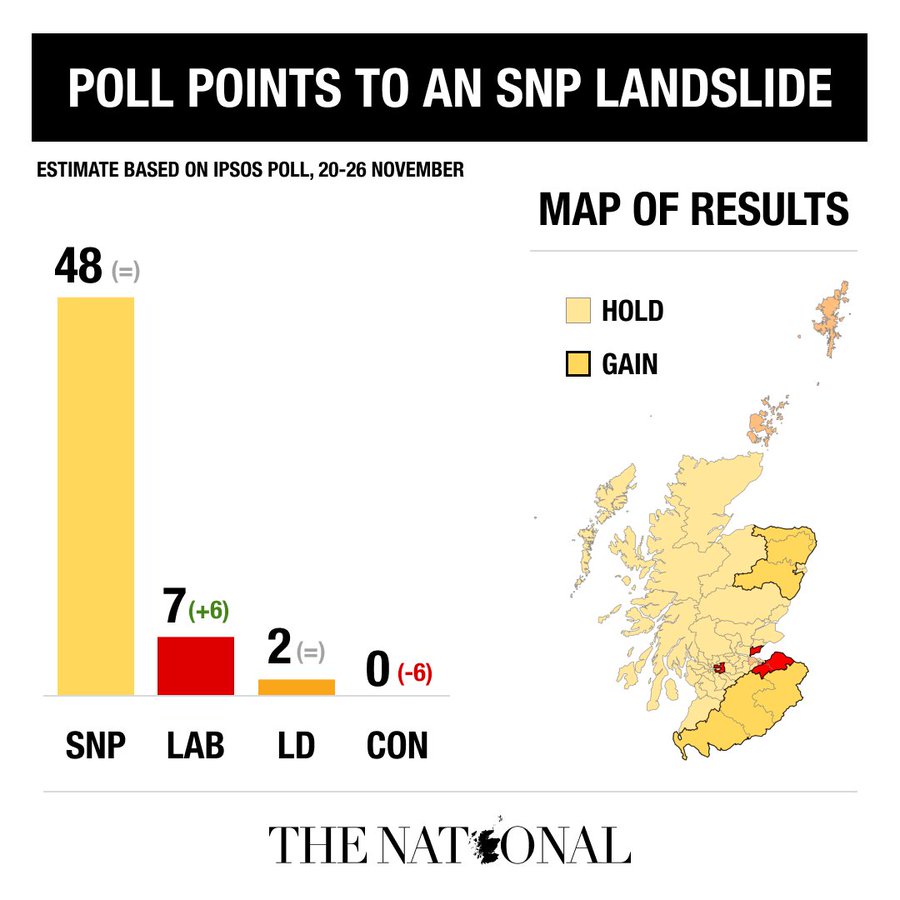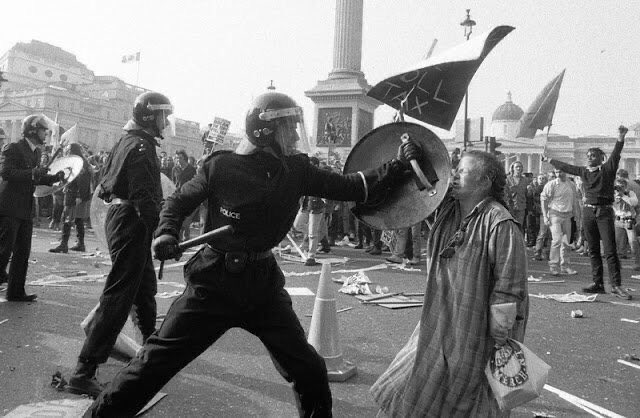Thatcher’s Long Shadow and Red White and Blue Labour
The shadow of Thatcher still casts itself over British society and over Scotland and England in different ways, as the response to Starmer’s comments praising her has showed. Thirty-three years after she left Downing Street in tears she is still evoked and weaponised – as Zoe Williams put it: “Starmer was just doing what Gordon Brown did in 2007, when he invited Thatcher into Downing Street … using Thatcher emblematically to project to the commentariat just how non-scary and non-socialist he intended to be.”

But that’s not how it was perceived north of the Border where she remains a source of sustained hatred, a powerful talisman evoking the worst of her era. Hatred of Thatcher, and Thatcherism is not exclusive to Scotland. I remember Yorkshire Miners visiting Edinburgh to lend support to their comrades at Bilston Glen in 1984. They will not have forgotten her. Nor will those portrayed on Boys from the Blackstuff (1982) or I, Daniel Blake (2016) – the dramatic portrayal of her most lasting legacy: mass unemployment and a punitive ‘welfare’ system. But the response to Starmer’s comments tell us much about politics north and south of the border today.
Keir Starmer praised Margaret Thatcher for effecting “meaningful change” in Britain in an article directly appealing to Conservative voters to switch to Labour. Writing in the Sunday Telegraph, the Labour leader said Thatcher had “set loose our natural entrepreneurialism” during her time as prime minister. He said:
“Across Britain, there are people who feel disillusioned, frustrated, angry, worried. Many of them have always voted Conservative but feel that their party has left them,” he said. “I understand that. I saw that with my own party and acted to fix it. But I also understand that many will still be uncertain about Labour. I ask them to take a look at us again.”
It’s a plaintive plea, but why? Labour has had a 20% poll lead for months now and has been way ahead for the past year. These are not voters he needs these are voters he wants. As John McTernan (of all people) has said: “Labour party’s relentless pursuit of Tory switchers is in danger of backfiring badly. Keir Starmer’s praise of Margaret Thatcher in the Sunday Telegraph is a double danger – it wins over no wavering voters but risks losing the goodwill of a wide range of his supporters, old and new.”
But if Starmer is alienating even people like McTernan within his own party, he is putting his party in Scotland in severe jeopardy. Anas Sarwar was surprised to be confronted on this, here by a journalist from The National – where he seems to pivot and deflect on the issue – trying to make out that the problem was with Alex Salmond (?) – or with The National. The truth is that Starmer’s rightward drift is a problem for Labour in Scotland, as recent polls show (though others are less favourable to the SNP). More on this here.

Unionist Fluidity
It may be that Starmer is making an even stranger calculation that will put further stress on the relationship with the party in Scotland. At the New Statesman, Ben Walker asks: who is leading in Scotland? He writes: “Recent polls suggest results could be more mixed for Labour. One Ipsos poll on House of Commons voting intention gave the SNP a lead of ten points, while a Redfield and Wilton survey put them two behind. Both reinforced the ambiguity over who’s leading in Scotland.”
He continues: “In Scotland, as in England, tactical voting is likely to play a key role at the next election: traditional Scottish Conservative supporters may lend their support to Scottish Labour – now confirmed as the SNP’s biggest rival – with fewer Labour voters moving in the opposite direction in Tory-SNP contests.”
“One of the joys of Scottish local elections is that they operate according to a preferential voting system, allowing us to see how many Scottish Tory voters have been willing to give Labour their second-preference vote. Analysis of recent by-elections shows this applies to as many as 20-30 per cent of Conservative supporters (with 10-20 per cent of Labour voters second-preferencing the Tories).”
“For logged-on activists in England, Labour voters willingly going Tory and vice versa may seem baffling. But in Scotland, proportional voting systems and divisions over independence have promoted “unionist fluidity”. Since Labour’s poll ratings make it the SNP’s strongest opponent in a majority of seats, enough Tory voters may back Starmer’s party to hand it overall victory.”
This is a dangerous gamble. It depends on a calculation that enticing Tory voters to vote tactically for Labour in Scotland can be balanced with the problem of the party moving so far to the right that it alienates Labour voters, who will either be put off voting at all, or will support the SNP. Perhaps, with the wind behind him, he has made this calculation? As we know, despite the recurrent lie, he doesn’t really need Scotland to win. Tory voters in Scotland know that voting Conservative is a wasted vote, and having worked so closely with Scottish labour for so long, it is not the massive event it might once have been to vote Labour. Added to this, the motivation is to defeat the hated-SNP, and the easiest way to do that is to vote Labour.
Equally, if you are a Scottish Labour voter dismayed at Starmer’s right-turn, his position on the war on Gaza, or his dog-whistle politics, never mind his praising of Thatcher, you may be able to turn a blind-eye with the motivation of ‘getting rid of the Tories’ and giving the SNP a kicking, But it’s not a certainty. Ben Walker states that “Redfield and Wilton records Labour attracting 21 per cent of the Tories’ base”. The question is – is a political campaign based on Tory votes going to appeal to the wider Labour voter? Can this hold? How much have Labour and Conservatives aligned in Scotland?
Almost daily we see Labour abandon previous pledges, commitments and ideals. Politicos say this is clever, tactical and reassuring, the rest of us wonder out loud what the point of such a denuded and hollowed-out Labour government will be. This week Starmer abandoned the ten pledges he made when he was elected. These have now been removed from his website:

It would be wrong however to see Starmer’s government-in-waiting as purely a tactical act, an opportunistic void. They have real politics. As I explain here they aim to be ‘economically radical and fiscally conservative’ – ‘stop patronising socially conservative voters’ – and address ‘legitimate concerns’ on crime and immigration. Their aim is “a new politics grounded in providing ‘security’, in the form of secure work, safe streets, and a strong nation.”
With that language and with the praise of Thatcher and his careful cultivation of the Tory vote it’s impossible to shake-off the ‘Red Tory’ allegation, or rather they are Red White and Blue Labour.
The question remains can Labour run the same campaign north of the border and win? Many people are appalled not just at the general state of abandonment of progressive social policy – but at the Labour leaderships disgraceful position on the attacks on Palestine. For many people this is akin to Blair’s actions on Iraq.
A Culture of Violence
So, what was Thatcherism and why is she still reviled? What of Starmer’s claim that she “set loose our natural entrepreneurialism” during her time as prime minister?
One of the many lasting legacies she has left, in my opinion, and one of the reasons it’s astonishing to praise her, is a culture of violence. The very first thing she did was raise the pay of the police, a force she knew she’d have to rely on to push through her political programme. She brutalised the miners and their families, she oversaw a country rocked by race riots, she took Britain to a bloody war in the Falklands, she actively supported the apartheid regime, she violently repressed the travelling community, but more than this she instituted the financial violence, the social violence of mass unemployment.

Police smashing a woman in the face with a shield, Poll Tax riot, central London, March 1990 by Paul Mattisson.
Of course above this are her economic policies, many of which endure and have become orthodoxy despite historic failure: mass and unquestioning privatisation, suppression of trade unions and human rights abuses, and the cultivation of the cult of the individual. The idea that you can cherry-pick from this desolation and keep your eye on ‘entrepreneurialism’ is absurd.
As David Clarke, former advisor to the late Robin Cook put it: “The most troubling thing about Starmer’s comments on Thatcher is that he panders to the myth that she halted or reversed the UK’s decline. It’s clear from the perspective of time that she did no such thing. She laid the foundations for our current malaise.”
The reality is Thatcher led a Tory Govt with a hostile, cruel, dangerous track record of lies and cover ups, political interference and state sanctioned police violence (such as Shoot to Kill in Northern Ireland). She criminalised strikers and protesters and destroyed communities and decimated whole industries. She was the driving force that led to Scottish Devolution more than anything else.
This culture of violence is everywhere during Thatcher’s era. To take just one example on 1 Jun 1985, British police attacked people visiting Stonehenge in the “Battle of the Beanfield“. Policed smashed vehicle windows and dragged people out through the broken glass, and then beat them.
You can read more here: libcom.org/history/1985-b

Margaret Thatcher sent her police against peaceful civilians in what became known as “The Battle of the Beanfield”. It is still the largest mass arrest of civilians since World War Two.

There were over 537 arrests resulting from what they called ‘Operation Solstice’. One commentator noted that “In a spiteful coordination, social services were on hand to take the children of the travellers into care. The last child was returned to their family in the early 2000s.”
State-sponsored violence was the hallmark of Thatcherism, not entrepreneurialism.
In this sense this is the week that we can see more clearly now than ever that Sir Keir Starmer is the ultimate victory of Thatcherism. The Labour Party now openly promises nothing other than a future of austerity. Thatcherism is alive and well and being promulgated by the Labour Party. That’s where we’re at.
And in the public sphere – to point this out – to point to the absurdity of a Labour leader praising Thatcher – is to open yourself to howls of derision.
So why is there such a difference north and south of the border? One suggestion is that in Scotland there is an alternative (though you would have to question how genuine, radical or – alternative it actually is). The other is that the Overton Window in England has narrowed and shifted so much that any Labour leader has to appease not just the Tory voters, but the billionaire press…
George Monbiot: “Keir Starmer was not trying to woo conservative voters, he’s trying to appease the billionaire press… it’s a profoundly undemocratic situation that this handful of billionaires have got their fingers around the throat of politics in this country”#PoliticsLive pic.twitter.com/HBqWzIIAHk
— Haggis_UK 🇬🇧 🇪🇺 (@Haggis_UK) December 4, 2023
Starmer’s evocation of a ‘strong nation’, his appeal to ‘legitimate concerns’, his euphemisms of ‘safe streets’, and ‘fiscal conservativism’ mark him out as the inheritor of Thatcherism far more than Tony Blair. Blair had all these undercurrents but he managed to make them recede into the background as he applied a patina of constitutional change. Starmer has none of that. There are other emerging parallel’s. In a report today by the Resolution Foundation called ‘Ending Stagnation’. You can download it here: Ending stagnation – The Inquiry (resolutionfoundation.org)
The reality of post-Brexit Britain has real similarities to 1970s Britain. ITV’s assessment from Tom Bradbury is brutal:
“Picture a country going backwards, where workers haven’t had a decent pay rise in 15 years, public services are on the verge of collapse, and the gap between rich and poor grows year on year” “That is how Britain was described today in a bleak and damming assessment of its economy. The failure to achieve all but negligible growth has left the average worker, a simply staggering, £10,000 a year worse off” “And we’re now lagging way behind countries we used to think of as equals. In Germany, middle income households are 20% richer than their peers in the UK” “We’d be here all night if we listed the failings identified in the 290 page report. But put simply, in almost every sector, the UK is just not productive enough”
Tom Bradbury, “Picture a country going backwards, where workers haven’t had a decent pay rise in 15 years, public services are on the verge of collapse, and the gap between rich and poor grows year on year”
“That is how Britain was described today in a bleak and damming… pic.twitter.com/kk8GnWVMnY
— Farrukh (@implausibleblog) December 5, 2023
This reality gives the backdrop to Starmer’s arrival, and a stunning parallel to Thatcher’s emergence in 1979. Such epic failure, such dark and dire conditions set the scene for the coming politics.

Thatcher’s stamp on political policing, conflation (of her government and the people), suppression of other women’s political careers, protection of vile individuals and employment of extremist economic cranks are among her legacies, but much of her reign remains obscured by official secrecy.
The repercussions of tonight’s Scotland versus England game could be more significant for British Unionism than any other game of football so far.
In what way, do you think? I ask in the knowledge that it was a humiliation for Scotland.
@Derek Thomson, the politics surrounding the UEFA Women’s Nations League final game between Scotland and England have been much discussed. England needed to significantly outscore the Netherlands who played Belgium in their final group game, played synchronously (and the scores in each game leapfrogged live in real time, conveyed to players on the pitch). At stake was top spot in League A Group 1 and qualification for the knockout phase leading to European and Olympics qualification places.
https://www.uefa.com/womensnationsleague/news/0280-17ce58583a8f-04a5021a2076-1000–2023-24-uefa-women-s-nations-league-how-it-works/
Whether there is a distinctive English nationalism in each of the Men’s and Women’s support is complicated by the recent success of England’s Women and the growing similarity in the professional and highly commercial England Men’s and Women’s club leagues. I haven’t followed crowd news, but if Crusader costumes and Bomber songs start featuring in the Women’s support, we might suppose the gap is closing. Both England senior teams seem still to ‘take the knee’, a rather empty gesture in the context of reparations for colonial crimes and slavery (Scotland’s Women did likewise in this match).
In the event, Netherlands (metropole of a Kingdom Empire itself with multiple football associations) just pipped England on a single goal difference, but the question of Team GB at the Olympics, for which only England’s national team’s placing counts, has split supporters of the Women’s game where the Olympics has been more significant than in the Men’s game.
If an alternative English nationalism was to be found, it might manifest in supporters of the Women’s team. If the British Empire (and other European and world empires) is irrational under a nations-norm-based international order, these events get caught in the gears and generate friction. If national sporting organisations might be under threat (why should much more populous nations have one team and the British four domestic and more colonial teams?), what effect would that have on the Union? If the Scottish Women’s football team was perceived to have conveniently folded 0–6 at home (despite pre-match protestations) in their game against England, though competitive in their 2–1 loss in England, what questions does that raise about the subordinate position of Scotland to England? What happens if the Gibraltar national football team becomes competitive?
If Imperialism is irrational and abusive, relies on privilege, patronage and selective silence, what role does sport play in throwing light on its true nature through its inconsistency with the level playing field demanded by universalist rules?
The article lists many of the negatives of Margaret Thatchers tenure and her legacy.
I always intensely disliked that Mrs Thatcher’s governments seemed to make personal greed and selfishness socially acceptable. Don’t get me wrong I understand that most of us have a degree of greed and selfishness within us but before 1979 it was not encouraged and not seen as a virtue so it was less open and prevalent in society.
@John, indeed, some kind of hypocritical cover for selfishness and greed was often employed in Britain, and it became a bit more naked under Thatcher, but that alone doesn’t explain her full-scale backing of the arms industry, the entrepreneurial flogging of torture equipment to apartheid South Africa, backing coups and destabilisation and corruption, in short the evil foreign policy pursued. There are other ways to make money.
The effect of dropping many kinds of manufacturing to promote largely useless or harmful over-financialised services was to make the British Empire even more of a World Vampire than before, with fake value, organised-crime-friendly jurisdictions, ghastly inefficiency and appalling waste through unproductive and irrational competition, and an especial enabling of the rabidly unhinged USAmerican Empire in its slavering drive towards global domination. And a loss of beneficial skillsets and work ethics derived from doing useful work well.
It was under Thatcher that the difference between public service corporation and criminal organisation became blurred to point of disappearing in some cases. Her privatisations were rightly characterised as massive thefts from the British people. Her policies were also geared at gerrymandering a Conservative electoral advantage, through corrupt practises and effective bribes, and creating a dispossessed underclass of people without political representation, abandoned by mainstream parties.
Starmer is a waste of space, and the Tories are truly grotesque.
As a Scot living in Canada for the last 20 years I sometimes ponder on returning to Scotland to live.
And then I consider the “United Kingdom”, and think, naw, no way.
A wee holiday now and then will have to suffice.
Starmer knows that his “Missions” are impossible (to implement) as the UK is well and truly ducked…..
He is now on a “mission” to prepare us all for the fact that the “change” and “Fresh start” that he promised is in fact now going to be just a ‘continuation’ of what we have all had to endure under the previous Tory regimes…….
More privatisation and favouritism for those private companies who donate to the coffers of his party….and let’s be honest if you, as a financial donor, donate to the Labour party in anticipation that they will then be the next UK government you then expect to get a RETURN for your money…….so the owners of that private Health company who donated to the shadow Health secretary and other Labour politicians, including their leader Starmer, did so in order that he, Wes Streeting, would then proclaim…..that “Labour would hold the door open for more privatisation in the NHS”…….but who will be first in line via that “open door” to get those contracts ?
“Sir Keir Starmer, the Leader of the Opposition and a prospective Prime Minister, has found himself enriched by the tune of £157,500.00 from donors associated with the private healthcare sector. Yvette Cooper, the Shadow Home Secretary, boasts an even more substantial sum of £295,205.00. Meanwhile, Dan Jarvis, juggling his role as the Mayor of South Yorkshire, has managed to secure a handsome £137,500.00 in donations from the private health industry. As for the Shadow Secretary of State for Health, the individual who would be entrusted with overseeing the NHS under a Labour government, his pockets have been lined with an impressive £193,725.00 in contributions”…….(sourced online via Labour Heartlands )…….so in other words CASH for INFLUENCE…..
See Peter Geoghegan’s book “Democracy for sale: Dark money and Dirty Politics.
Money talks and thus so do donations to political parties and also those who donate to those parties , who are it seems, THE ones who will REALLY dictate much of the government policy (direction) and too their decisions, on where and who to , as a government, investments will be invested with and in….. and this is very much the road upon which we have ALREADY travelled down via the UK under the Tory UK government and will also be the one we will also CONTINUE to travel down under the next Labour government……if they are indeed elected as the new UK government in the next GE……
However in Scotland we have a media (and too the branch offices of political pro UK parties) to distract us with matters that they deem more significant than the above REAL concerns as they, as a media (and Pro UK opposition parties), adopt their true “mission” in trying to influence our opinions in Scotland……. upon OTHER matters/concerns that they dictate as being the ONLY ones we should be obsessing on…..via what they try to present as being matters connected to a Scottish devolved government that is, within their UK, apparently to be considered as one that is somehow unique in their catalogue of apparent failings as a government (as quoted and promoted by the media and opposition Pro UK parties)…that is in them, the devolved Scottish government, being accused of being REALLY flawed, REALLY corrupt, REALLY incompetent and thus REALLY NOT working for Scotland and it’s people as opposed to them reflecting the opinions of those of us, who are supportive of independence , who know who it is within their UK and it’s politics who are THE actual ones who really do far MORE damage to us while we Scotland are still within their UK……and Keir Starmer is part of that UK political problem and not , as he touts , one who offers a solution via any REAL “change” or REAL “Fresh Start”……..BUT instead all he offers is just a continuation of all that we in Scotland have had to endure under the Tory UK government(s) and what we will still have to endure under a Labour UK government ……while we , Scotland, are STILL a part of his UK…….so how do we break the cycle ?……that is the never ending revolving door of either suffering under a Tory government or a Labour one…..as the apparent ONLY two options that Scotland must tolerate as still being a part of their UK……well it seems obvious but apparently dark money and dirty politics, a dysfunctional partisan media, together with apathetic and uninformed fellow Scots (and complicit Pro UK ones too), is what it is that prevents us from breaking free FROM that cycle that is dominated by UK politics, a Pro UK media and also the pro UK parties who dominate politics within their UK……..ducked if I know how to counteract that mighty force……..but I do live in hope that something eventually has to break ……..as in something has to eventually give…..and when it does well……what WILL, for some Scots, be their preferred solution to the problem that is…..the UK.
????????. etc etc (including the answer)
Try and have a great day everyone …..while still living within Absurdistan aka the UK….LOL
🙂
Agree with much of the article. Thatcher was vile & violent. Sir Kid Starver will be worse. In the case of the Resolution Foundation & its report. The report is trash from start to finish. I will leave it to Richard Murphy in his blog to do the demolition:
https://www.taxresearch.org.uk/Blog/2023/12/09/the-resolution-foundations-proposed-method-for-ending-stagnation-would-deliver-a-massive-recession-instead/
The Uk is finished. Scotland would do well to exit asap.